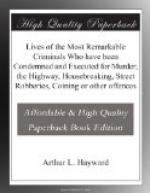Never poor creature suffered more or severer hardships in the road of death than this poor man did, for by the time sentence was passed, all that he had was gone, and he had scarce a blanket to cover him from downright nakedness, during the space he lay in the hold under sentence. As he was better principled in religion than any of the other malefactors, he had retained his reading so well as to assist them in their devotions, and to supply in some measure the want of somebody constantly to attend them in their preparation for another world. So he picked up thereby such little assistances from amongst them as prevented his being starved before the time appointed for their execution came.
As this man did not want good sense, and was far from having lost what learning he had acquired in his youth, so the terrors of an ignominious death were quickly over with him, and instead of being affrighted with his approaching fate, he considered it only as a relief from miseries the most piercing that a man could feel, under which he had laboured so long that life was become a burden, and the prospect of death the only comfort that was left. He died with the greatest appearance of resolution and tranquillity on the 3rd August, 1726, being then about twenty-three years of age.
The Life of EDWARD REYNOLDS, a Thief, etc.
Notwithstanding the present age is so much celebrated for its excellency in knowledge and politeness, yet I am persuaded both these qualities, if they are really greater, are yet more restrained than they have been any time herefore whatsoever. The common people are totally ignorant, almost even of the first principles of religion. They give themselves up to debauchery without restraint, and what is yet more extraordinary, they fancy their vices are great qualifications, and look on all sorts of wickedness as merit.
This poor wretch who is the subject of our present page was put to school by his parents, who were in circumstances mean enough; but from a natural aversion to all goodness he absolutely declined making any proficiency therein. Whether he was educated to any business I cannot take upon me to say, but he worked at mop-making and carried them about to the country fairs for sale, by which he got a competency at least, and therefore had not by any means that ordinary excuse to plead that necessity had forced him upon thieving. On the contrary, he was drawn to the greatest part of those evils which he committed, and which consequently brought of those which he suffered, by frequenting the ring at Moorfields—a place which since it occurs so often in these memoirs, put me under a kind of necessity to describe it, and the customs of those who frequent it.




